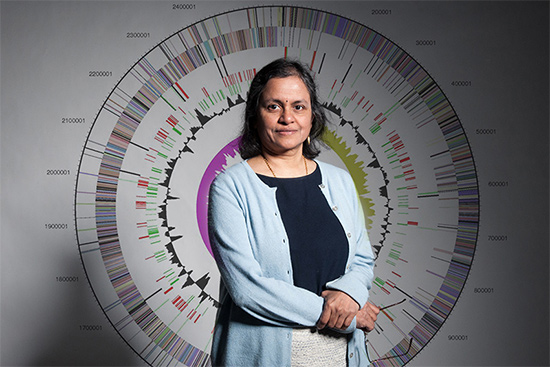Sudha Seshadri Awarded $20m to Better Understand Alzheimer’s Disease
Sudha Seshadri, MD, professor of neurology, has been awarded three grants this year totaling nearly $20 million from the National Institute on Aging (NIA) and the National Institute of Neurological Disorders and Stroke (NINDS). The three multi-year awards will allow her to continue her work researching healthy brain aging, stroke, Alzheimer’s Disease (AD) and dementia in the Framingham Heart Study (FHS), identifying blood and imaging biomarkers for stroke, dementia and rare AD genes.
 Sudha Seshadri, MD. Photo by Janice Checchio
Sudha Seshadri, MD. Photo by Janice Checchio
Seshadri has been an investigator at the FHS since 1998, leading the clinical neurology and neurogenetics cores since 2005. Specifically, her research involves exploring the cumulated and age-specific impacts of a wide variety of genomic and environmental risk factors underlying stroke, dementia and brain aging across generations of participants.
According to Seshadri, while the total number of persons with AD is increasing as the population ages, data from four decades of FHS research suggests that the risk at any given age for AD actually is declining. “We plan to study the reasons for this hopeful trend in detail through continuing our surveillance for dementia and cognitive impairment, collecting cutting-edge brain imaging (amyloid and tau-PET, volumes, connectivity and perfusion on MRI) in the dementia-free (preclinical AD), and using sophisticated analysis of very extensive genetic data already collected on Framingham subjects. This could help us better understand AD trends and biology and identify new biomarkers and treatment targets,” she explained.
Seshadri has been especially focused on the role of reversible lifestyle, vascular and metabolic risk factors in determining dementia risk with a special focus on understanding the causal pathways and biomarkers, as well as genomic and epigenetic variations underlying brain aging, stroke, AD and vascular cognitive impairment.
Among her many significant research contributions, she is responsible for the development of the concept of lifetime risk as applicable to dementia and other chronic diseases; she helped establish plasma homocysteine as an important risk marker for dementia and AD; she has described novel genes associated with stroke and AD and is a principal investigator (PI) on several large international consortia.
Seshadri completed her MBBS from the Christian Medical College, Madras University, and her MD in Internal Medicine and DM in Neurology from the All India Institute of Medical Sciences, New Delhi, India. Additionally, she completed her residency in neurology at the BUSM and a fellowship in the Neurobiology of Aging and Alzheimer Disease at the University of Massachusetts Medical Center and the FHS. As a clinician, she sees patients with dementia and other neurological conditions and teaches residents. As a research mentor, she guides over a dozen post-doctoral fellows and junior faculty conduction research using data collected on the FHS participants.
The NIA is one of 27 Institutes and Centers of the National Institutes of Health. It leads a broad scientific effort to understand the nature of aging and to extend the healthy, active years of life. NIA is the primary federal agency supporting and conducting Alzheimer’s disease research.
The mission of the National Institute of Neurological Disorders and Stroke is to seek fundamental knowledge about the brain and nervous system and to use that knowledge to reduce the burden of neurological disease.
View all posts